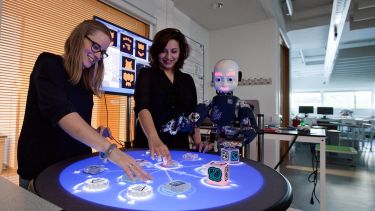- The University of Sheffield has been awarded a share of the UK’s biggest-ever investment in engineering doctoral skills to train the next generation of engineers, highly skilled in digital manufacturing
- Digital technologies are recognised as a key productivity enabler, but significant challenges are preventing them being fully integrated into UK manufacturing and economy
- A new Centre for Doctoral Training (CDT) at Sheffield will work closely with industry to produce engineers highly skilled in areas of industrial need
- Sheffield is also partnering in nine new CDTs addressing key challenges in areas of national importance, including energy, infrastructure, materials, manufacturing assembly and machining, medicines and semiconductors
Engineers with high quality skills in digital manufacturing - key to boosting UK productivity - are set to be trained by the University of Sheffield.
As part of the UK’s biggest-ever investment in engineering and physical sciences doctoral skills, totalling more than £1 billion, announced by Science, Innovation and Technology Secretary Michelle Donelan, the University of Sheffield has been awarded funding to establish a new Centre for Doctoral Training, which will help students develop skills that are crucial for the future of UK manufacturing.
It will be led by Sheffield’s Faculty of Engineering, already home to one of the largest cohorts of undergraduate engineering and computer science students in the UK. Also working alongside the University of Sheffield Advanced Manufacturing Research Centre (AMRC), a network of world-leading research and innovation centres that works with advanced manufacturing companies throughout the UK and around the globe. The new CDT will produce the next generation of engineers with the digital skills needed to boost UK manufacturing.
UK growth lags behind Europe and North America, and whilst its advanced manufacturing sector is celebrated, poor productivity and skills gaps are thought to be leading to uneven and lower growth across the country. Digital technologies are recognised as a key productivity enabler, however there are significant challenges in integrating them into UK manufacturing and the economy.
Sheffield’s CDT is set to address these by equipping students with digital skill sets dedicated to the four productivity challenges in manufacturing; sustainability, speed, quality and flexibility. It will train engineers closely with industrial partners, who will help identify the scope of each studentship to ensure they are highly skilled in areas of industrial need, and students with backgrounds from across the spectrum of engineering and science will be sought after to help create a more diverse manufacturing workforce.
Professor Neil Sims, Professor of Mechanical Engineering at the University of Sheffield and lead of the CDT, said: “We are really excited to be able to lead this CDT in collaboration with the AMRC. The UK's high value manufacturing sector has a great opportunity to increase its productivity and sustainability through digital engineering, for example by combining computer models with measurement data from production systems.
“New research ideas on topics like data science, artificial intelligence, and engineering modelling are ripe for application to this area of manufacturing, and so the collaboration between the Faculty of Engineering and the AMRC provides us with an excellent foundation for our centre. Our students will have a unique experience, working at the forefront of the UK's High Value Manufacturing activities within the AMRC, and so we expect them to become future leaders for the manufacturing sector.”
Professor David Curtis, Professor of Subtractive Manufacturing at the University of Sheffield Advanced Manufacturing Research Centre (AMRC), said: “We are extremely grateful for the backing from the EPSRC in our vision, and the support we have received from our industrial partners in co-creating this offering. The new centre will build off the strengths of our previous CDT in Machining Science where, alongside the Faculty of Engineering, we helped deliver our greatest asset, our alumni. With graduates taking on critical roles in the high value manufacturing sector, they continue to generate impact at scale and influence the future of UK manufacturing. We are really looking forward to repeating this with a fresh set of priorities.
“Expanding our focus across key disciplines of machining, assembly and digital engineering builds on over 20 years of innovation at the AMRC, where we play a leading role within the High Value Manufacturing Catapult (HVMC). Bringing together research, innovation and industry in each studentship will allow us to respond in a connected manner to industrial challenges, ensuring a pathway to impact. We all need to respond to the Net Zero challenge, in sectors like aerospace we will see significant product disruption which will provide significant opportunities for manufacturing innovation. Research carried out within this centre, and the alumni we train will play a key part in shaping the future.”
As part of the investment, the University of Sheffield is also partnering in nine other new CDTs to support training in areas of UK national importance. These centres are:
- Developing National Capability for Materials (Mats4.0)
- Offshore Wind Energy Sustainability and Resilience
- Fusion Power
- Sustainable Sound Futures
- EPSRC Centre for Doctoral Training in Green Industrial Futures
- Water Infrastructure and Resilience
- Cyber-physical Systems for Medicine Development and Manufacturing (CEDAR)
- SATURN - Skills and Training Underpinning Renaissance in Nuclear
- Compound semiconductors
Professor Koen Lamberts, President and Vice-Chancellor of the University of Sheffield, said: "I am incredibly proud to see colleagues at Sheffield leading on and collaborating with so many of these new CDTs, which are in hugely important areas for the future of the UK. Engineering is part of the fabric of our university, with our AMRC and engineering faculty working closely with industry to deliver world-class engineering education and research. I am delighted to see our expertise recognised through these awards and I am looking forward to seeing the impact they have on the careers of our students, UK industry and the economy."





